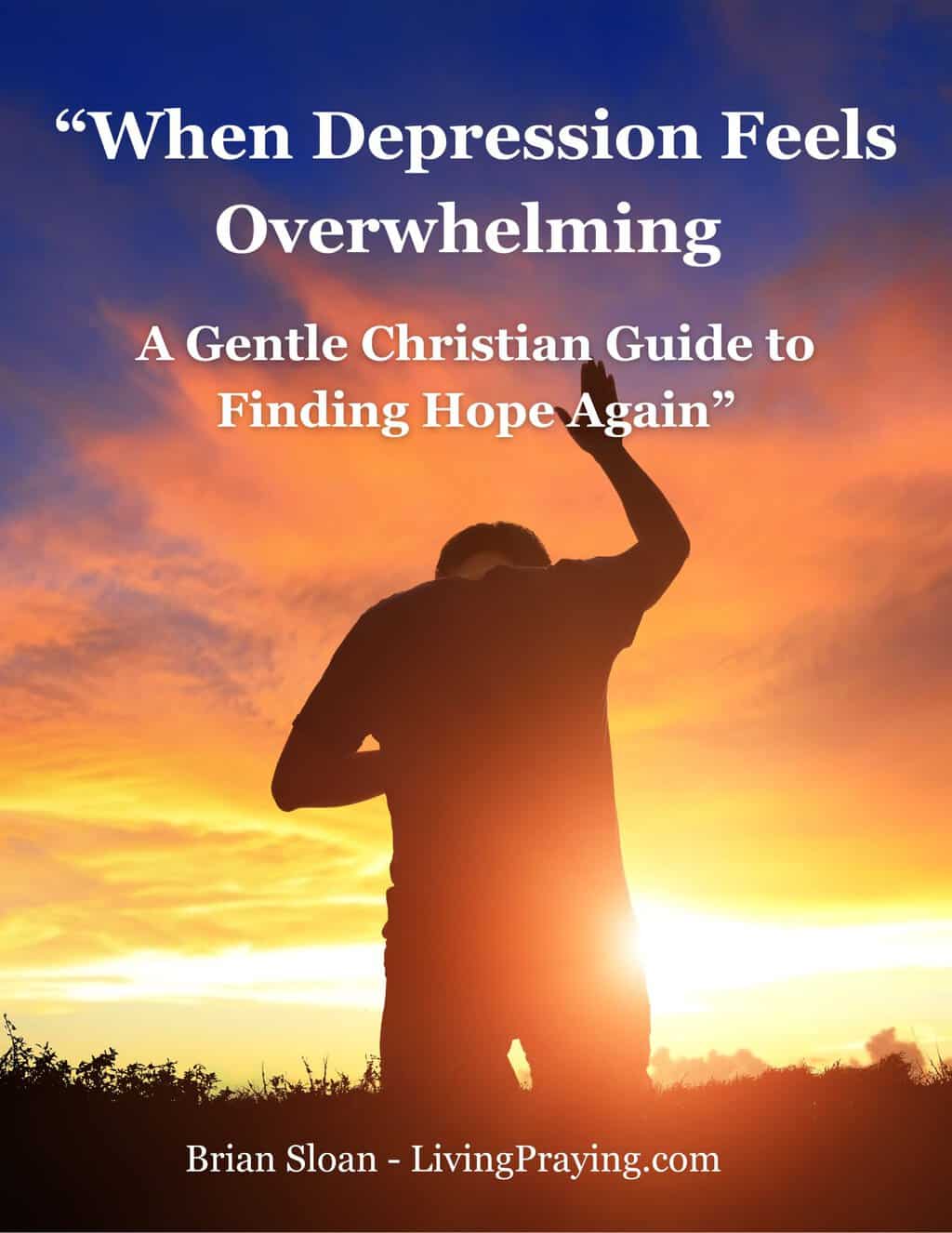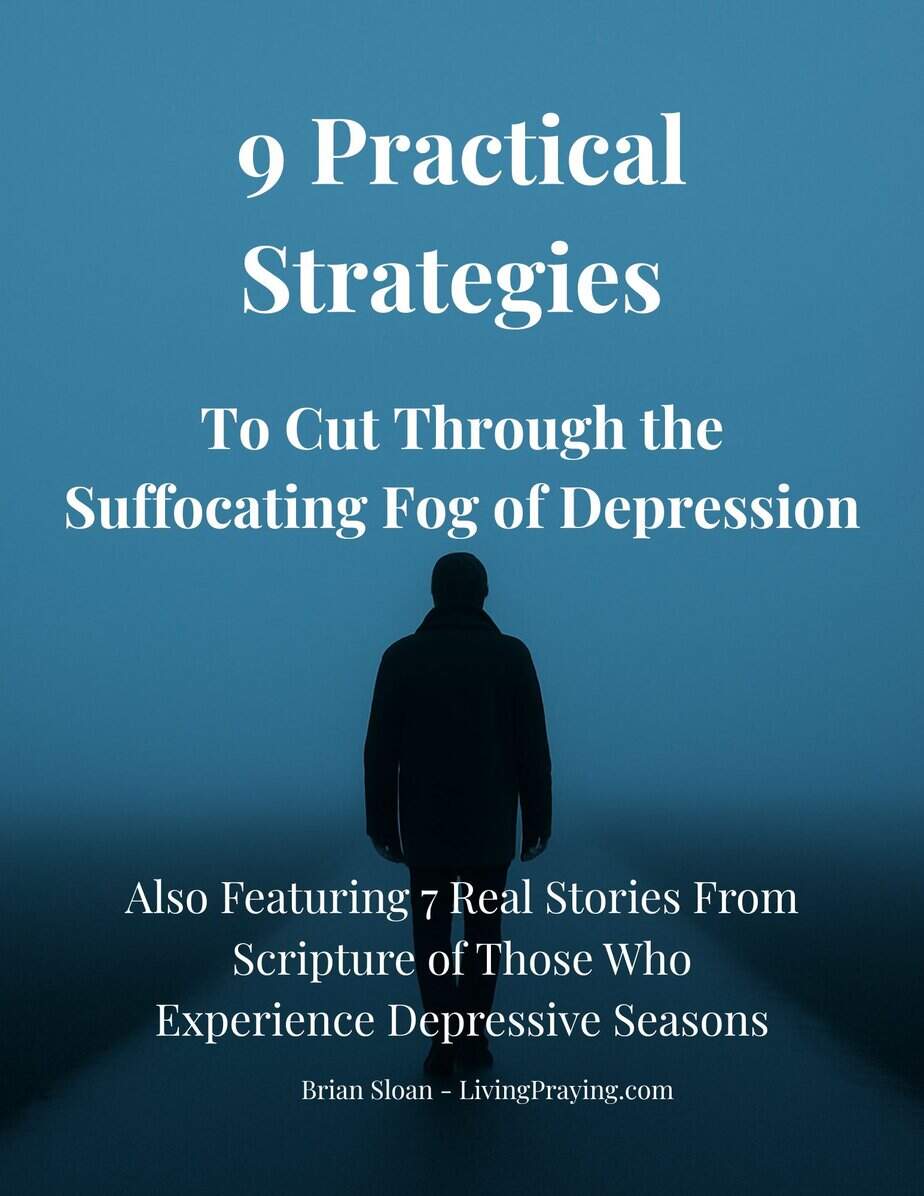Published: June 26, 2025
Why Men Struggle Differently with Depression
Depression in Christian men is more common than most people realize—but it’s also more misunderstood. If you’re a Christian man struggling with depression, or you love someone who is, this post is for you.
You’ll find biblical honesty, faith-based insight, and practical encouragement—without shame, clichés, or quick fixes. This isn’t a medical manual or a sermon. It’s a conversation for men of faith who feel tired, stuck, or spiritually numb… and aren’t sure what to do next.
But if you’re reading this and you’re not a Christian yet, know this: Jesus is not far from you. He sees your pain, He knows the weight you’re carrying, and He invites you to come to Him.
“Come to Me, all who are weary and burdened, and I will give you rest.” (Matthew 11:28)
You can put your faith in Him today—not as a quick fix for your depression, but as the One who loves you, saves you, and walks with you through every valley. If you’re ready to trust Him as your Savior, He’s ready to receive you.
The Social Stigma Is Real—But It’s Wrong
There’s a deeply ingrained message in our culture that says real men don’t cry. That asking for help is weakness. That struggling emotionally is somehow unmanly or embarrassing.
This stigma is powerful—and damaging. It causes countless men to keep their pain bottled up, to suffer silently, and to assume no one would understand if they spoke up.
But here’s the truth: being honest about your pain takes more strength than pretending you’re fine. Vulnerability is not weakness—it’s courage. And seeking help is not a failure of faith—it’s an act of wisdom.

Free Christian Depression Guide
A short, gentle devotional PDF to help you breathe, steady your heart, and remember you are not alone in this season.
Download the Free GuideClichés May Only Dig the Hole Deeper
Even in Christian circles, men battling depression are too often met with unhelpful clichés:
- “Just give it to God.”
- “You need more faith.”
- “Count your blessings.”
These phrases might be well-intentioned, but when someone is in a fog of emotional and spiritual exhaustion, they can feel dismissive, even shaming. They offer little comfort and often increase the sense of failure or guilt a man already carries.
Men don’t need quick fixes. They need real conversations, compassionate understanding, and practical steps rooted in Scripture—not slogans.
The Faith Factor: “If I Trust God, Why Do I Feel This Way?”
One of the most painful layers for Christian men is the spiritual confusion that comes with depression. Many wonder:
- If I love Jesus, why can’t I shake this?
- Am I disappointing God?
- Shouldn’t my faith be stronger than this?
The truth is, even the most faithful men in Scripture experienced deep emotional valleys. David, Elijah, Job, and Paul all hit points of despair. Feeling depressed does not mean your faith is broken. It means you’re human. And God meets us in that humanity with grace, not condemnation.

Click Here to scroll to our most helpful resource for depression.
The Bible Is Honest About Men and Depression
One of the most powerful truths Scripture offers is this: you’re not the first godly man to feel broken.
From cover to cover, the Bible doesn’t sugarcoat emotional suffering. It doesn’t skip over the despair, burnout, and inner battles faced by men of great faith. Instead, it tells their stories in raw, unfiltered honesty.
David: A Man After God’s Own Heart… and Deep Sorrow
David—the warrior, king, and songwriter—poured out his anguish in the Psalms. He wrote of sleepless nights, crushed bones, and a soul “drenched in tears” (Psalm 6:6). He cried out:
“Why are you cast down, O my soul? And why are you in turmoil within me?” (Psalm 42:5)
David wasn’t lacking faith. He was expressing pain. And God called him “a man after My own heart.”
Elijah: From Victory to Suicidal Despair
After calling down fire from heaven and defeating the prophets of Baal, Elijah ran into the wilderness and collapsed under a tree. He was overwhelmed, exhausted, and afraid.
“I have had enough, Lord. Take my life.” (1 Kings 19:4)
God didn’t scold him. He let him rest. Then He gently restored him—body, soul, and spirit.
Job: Blameless… and Broken
Job had done nothing to deserve his suffering. Yet he lost everything—and grieved deeply. His friends tried to offer spiritual-sounding answers, but Job needed more than theology. He needed presence, patience, and a God big enough to handle his questions.
“I will give free rein to my complaint and speak out in the bitterness of my soul.” (Job 10:1)
Paul: Despairing of Life Itself
Even Paul, the bold apostle and church planter, wasn’t exempt from emotional collapse:
This was not a man in rebellion. This was a man under pressure—honest about his limits, and fully dependent on God’s sustaining grace.
🙏 You’re Not Alone in the Fog
These men weren’t weak. They weren’t spiritually immature. They were human—and they were loved by God in their darkest moments.
If Scripture gives space for their stories, it gives space for yours, too.
Signs of Depression in Men to Watch For
Depression doesn’t always look like sadness—especially in men. While women are more likely to express feelings of emptiness, hopelessness, or weeping, men often exhibit non-traditional or even hidden symptoms that can be easy to miss, mislabel, or ignore.
Understanding how depression shows up in men is critical—not only for those who are struggling, but also for spouses, family members, friends, and church leaders who want to help without shaming or misunderstanding.
🧍♂️ 1. Withdrawal and Isolation
One of the earliest and most common signs of depression in men is a subtle pulling away from relationships. A man who used to be social, talkative, or involved in his family may now:
- Retreat to his garage, basement, or car for long periods
- Avoid phone calls or social invitations
- Sit quietly in a room without engaging
- Skip church or men’s groups without explanation
He may not say “I’m hurting.” But his disengagement is often a silent cry for help.
😠 2. Irritability and Short Fuses
While women may become tearful or anxious, many depressed men become easily irritated. The emotional pressure builds beneath the surface and comes out as:
- Sudden outbursts at small things
- Impatience with kids, co-workers, or even the dog
- Sarcasm, moodiness, or an edge of bitterness
This isn’t just a “bad day.” It’s a sign of internal exhaustion showing up on the outside.
💤 3. Fatigue and Physical Slowness
Depression affects more than emotions—it hits the body hard. Men may feel:
- Worn out no matter how much they sleep
- Sluggish or foggy during the day
- Frequent headaches or digestive issues
- Muscle tension or unexplained aches
If you hear someone say, “I just feel heavy all the time,” that’s not laziness. That could be a sign of something deeper.
😶 4. Emotional Numbness or Spiritual Flatness
Many Christian men with depression don’t feel despair—they feel nothing at all. They may describe it as:
- “I feel like I’m on autopilot.”
- “I’m just going through the motions.”
- “I can’t feel God anymore.”
- “I pray and read my Bible but it’s like static in my soul.”
This numbness isn’t rebellion—it’s often a defense mechanism from prolonged stress or grief. It doesn’t mean your faith is gone. It means your heart is overwhelmed and needs care.
📱 5. Overworking, Overeating, or Over-Scrolling
Sometimes, depression hides behind overcompensation. Men may drown out their feelings with:
- Long work hours (“If I stay busy, I won’t have to think.”)
- Mindless scrolling, gaming, or binge-watching
- Overeating or drinking more than usual
- Pornography or risky behavior (as a form of escape)
These are not the core problem—they are coping strategies that mask deeper pain.
🧨 6. Thoughts of Hopelessness or “Checking Out”
Perhaps the most dangerous sign is a quiet resignation. A man may not say he wants to die—but he may begin to:
- Speak as if life is meaningless
- Say things like, “They’d be better off without me.”
- Withdraw emotionally from his spouse or children
- Engage in self-sabotaging behavior
This is when intervention matters most. It’s not enough to say “tough it out.” It’s time to ask questions, listen without judgment, and take next steps.
📣 If You See These Signs, Speak Life
Don’t wait for a man to “open up.” Most won’t until someone notices and invites them to. If you see these signs in your husband, father, friend, or yourself—don’t dismiss them.
You don’t have to solve everything, but you can:
- Gently ask how they’re really doing
- Offer to sit with them at the doctor or pastor’s office
- Pray with them, not just for them
- Point them to hope and resources that don’t feel like shame
💡 Pro Tip: Acknowledge the difficulty without judgment. Say something like, “This doesn’t mean you’re weak—it means you’re carrying too much alone.”

What Depression Is Not
Before we talk about how to heal, it’s crucial to talk about what depression is not. Because many Christian men carry a burden they were never meant to bear: the false belief that their emotional struggle means they’ve failed spiritually.
Let’s clear the fog by confronting a few dangerous myths—lies that have kept too many men suffering in silence.
❌ Depression Is Not a Lack of Faith
Certainly, most of us could do more to help develop and exercise our faith in God. However, one of the most harmful messages Christian men receive—sometimes even from well-meaning friends or sermons—is that if you’re depressed, you must not trust God enough.
That’s not just untrue—it’s unbiblical.
- David trusted God and still cried out in despair.
- Elijah saw fire fall from heaven and still asked God to take his life.
- Paul planted churches and still said he “despaired of life itself.”
These men weren’t weak in faith. They were real men with real burdens, and they brought those burdens to God. That’s not failure—that’s what faith does.
❌ Depression Is Not a Sin
Depression can be caused or worsened by sin—just as it can by physical illness, trauma, isolation, or burnout—but depression itself is not a moral failure.
It’s not a punishment from God.
It’s not rebellion.
It’s not disobedience.
It’s not something to be confessed and forgotten.
The Psalms show us again and again that lament is not sinful—it’s sacred. In fact, refusing to be honest about your pain may be more harmful than admitting it.
❌ True Depression Is Not Just a Bad Mood You Can Shake Off
We are not talking about having a bad couple of days or just a “case of the blues” for a day or so. True depression is deeper. So, telling a depressed man to “cheer up” is like telling a man with a broken leg to “just walk it off.” It ignores the depth of what’s happening inside.
Depression is not laziness. It’s not self-pity. It’s not just a “slump.”
It is a complex condition that affects your mind, body, and spirit. And while some days are better than others, it doesn’t simply disappear because someone says, “Think positive.”
The healing journey requires time, compassion, and real support—not pressure to “snap out of it.”
❌ Depression Is Not Evidence That God Has Abandoned You
This may be the most crushing lie of all. When you feel emotionally numb or spiritually dry, it’s easy to believe that God is silent—or worse, that He’s gone.
But Scripture says something different:
“The Lord is near to the brokenhearted and saves the crushed in spirit.” (Psalm 34:18)
“Even when I walk through the darkest valley, I will not be afraid, for you are close beside me.” (Psalm 23:4)
God isn’t repelled by your brokenness. He draws near to it. He’s not waiting for you to “get it together”—He’s already with you in the valley, offering comfort and grace.
🕊️ It’s Time to Let Go of Shame-Based Thinking
When you understand what depression is not, you’re finally free to face what it is—and begin walking toward hope, healing, and help.
💬 Reflection Prompt:
Have you been blaming yourself for something that’s not your fault? What beliefs about depression might God be inviting you to unlearn?
Where Faith Meets Mental Health
For many Christian men, the idea of seeking help for depression feels like stepping into unfamiliar—and uncomfortable—territory. Mental health has long been treated as something “secular,” while faith has been seen as the only valid path to healing.
But here’s the truth: you don’t have to choose between faith and mental health.
God is not threatened by your emotions. He is not disappointed that you’re struggling. And He certainly isn’t opposed to you getting the help you need.
🛠️ God Works Through Both Miracles and Means
Throughout Scripture, we see God use natural and spiritual means to bring healing:
- He told Naaman to wash in the Jordan seven times (2 Kings 5:10).
- Jesus made mud and applied it to a blind man’s eyes (John 9:6–7).
- Paul told Timothy to take a little wine for his stomach ailments (1 Timothy 5:23).
If God can use mud, rivers, and wine—He can use counseling, medication, and therapy to help heal your mind and heart.
Choosing to see a Christian counselor or take a prescribed antidepressant isn’t a denial of faith—it’s a recognition that healing can be a process, not just a moment.
🙏 Prayer Is Powerful—But The Answers Aren’t always immediate
We should never stop praying. God listens. God answers. But answers can take time.
Sometimes, God calms the storm.
Sometimes, He strengthens you to walk through it.
Both are miracles. Both are mercy.
If you’ve prayed and still feel stuck, it doesn’t mean prayer failed. It may mean God is inviting you to take the next step—to reach out, to open up, to begin healing with others by your side.
“We were under great pressure, far beyond our ability to endure, so that we despaired of life itself.” (2 Corinthians 1:8)
🧠 You Can’t Renew a Mind You Refuse to Acknowledge
Romans 12:2 says, “Be transformed by the renewing of your mind.” But you can’t renew what you pretend isn’t broken.
Ignoring depression doesn’t sanctify you—it delays your healing.
Renewal begins with honesty.
Healing begins with humility.
God meets us not at the mask, but at the truth.
And the truth is: Christian men can struggle with depression—and still be faithful, strong, and loved.
🛤️ A Spiritual and Practical Path Forward
So what can faith-based healing actually look like?
It might include:
- Talking with a Christian counselor who understands both Scripture and suffering
- Creating space for rest, silence, and emotional reset
- Practicing spiritual habits in gentle ways—Scripture, worship, journaling, walks with God
- Taking small steps like getting sunlight, eating well, and moving your body
- Using resources like devotionals or eBooks tailored for this exact battle
God isn’t asking you to climb a mountain today. He’s inviting you to take the next small step toward hope—with Him by your side.
💬 Reflection Prompt:
What would it look like to treat your mental health as something God cares about—something worth protecting and investing in, not hiding or ignoring?

3 Hope-Filled Truths for Depressed Men
Depression lies. It tells you you’re alone. That nothing will change. That you’re too far gone. That God is disappointed in you.
But those voices are not the voice of your Shepherd.
When depression clouds your thinking, you need solid truths that don’t shift with your emotions—truths rooted in God’s Word, not your circumstances.
Here are three truths you can stand on, even when everything else feels unsteady:
💡 1. You’re Not Alone—God Is Near to the Brokenhearted
Depression often isolates. It convinces you that no one understands, and that if they did, they’d walk away. But God draws near in your darkest hour—not away.
“The Lord is close to the brokenhearted and saves those who are crushed in spirit.”
—Psalm 34:18
You may not feel His presence. But feelings don’t determine truth. Scripture says He is near. Even when your mind is foggy, God is not far.
And not only is He near—He understands. Jesus Himself was called “a man of sorrows, acquainted with grief” (Isaiah 53:3). He knows what it means to suffer, to cry, to feel the weight of the world.
🪖 2. Your Identity Is Not Your Depression
When you’ve been struggling for a long time, it’s easy to internalize the pain. You don’t just feel depressed—you start to believe that depression is who you are.
But that’s a lie.
If you are in Christ, your core identity hasn’t changed—even if your emotions have. You are still:
- A beloved son of God (John 1:12)
- Redeemed and forgiven (Ephesians 1:7)
- Chosen and not forsaken (1 Peter 2:9)
- Sealed with the Spirit (Ephesians 1:13)
- Created with purpose, even on your lowest day (Ephesians 2:10)
Depression may describe your experience right now—but it does not define your worth or your future.
🔋 3. God’s Strength Is Made Perfect in Your Weakness
When you feel broken, tired, and empty, you are exactly where grace meets you. God isn’t looking for self-sufficiency—He’s looking for surrender.
“My grace is sufficient for you, for My power is made perfect in weakness.”
—2 Corinthians 12:9
It’s okay to admit you’re not okay. That may be the moment when God begins rebuilding what you thought was lost. His strength begins where your strength ends.
You don’t have to climb out of the pit alone. You can let go of the performance—and lean into the mercy that carries you.
💬 Reflection Prompt:
Which of these truths do you need to hold onto today? Write it down. Pray it out loud. Let it speak louder than the lies.
How to Take the First Step Out of the Fog
When you’re deep in depression, even the idea of getting better can feel overwhelming. You don’t need a 30-day plan. You need one small, doable next step.
Healing rarely happens all at once. It usually begins with a whisper, a breath, a flicker of hope that says, “Maybe I don’t have to stay stuck forever.”
Here’s how to begin moving—just a little—toward the light again:
🗣️ Talk to Someone You Trust
This is one of the hardest and most important steps: don’t stay silent. Whether it’s your spouse, a pastor, a friend, or a counselor—say something. It doesn’t have to be polished. Try:
- “I’m really struggling lately.”
- “I feel numb all the time, and I don’t know what to do.”
- “Can I talk to you about something heavy?”
You’d be surprised how many people will meet you with grace—not judgment.
📆 Make a Simple Appointment
Call your doctor. Reach out to a counselor. Find a faith-based therapist who understands both emotional health and spiritual life.
Even if you don’t know what to say—just show up. That alone is a bold, faith-filled act of courage.
And if you’re not ready for counseling yet, start with a support group, men’s ministry, or trusted mentor. You weren’t meant to walk through this alone.
📖 Turn to God in Gentle Ways
Sometimes depression makes prayer feel impossible. Don’t force long devotionals or intense worship sessions. Just begin with:
- One honest sentence: “God, I’m tired and don’t know what to say.”
- One verse: “The Lord is near to the brokenhearted” (Psalm 34:18)
- One moment of stillness: sit with God in silence, no pressure
You don’t have to be strong for God to meet you. He is strong for you.
🚶♂️ Do the Next Right Thing
Not the perfect thing. Just the next right thing.
- Take a short walk.
- Drink a glass of water.
- Go to bed 30 minutes earlier.
- Text a friend.
- Open your Bible to a Psalm.
Each small act chips away at the fog—and reminds your soul that you’re still moving, still breathing, still worth loving.
📘 Need Help That’s Practical and Christ-Centered?
If you’re looking for something simple and hope-filled to walk you through the fog, I created a short ebook just for you (or someone you love).
🟨 9 Practical Strategies to Cut Through the Fog of Depression
This downloadable guide is written specifically for believers who feel stuck, exhausted, or quietly drowning inside. Inside, you’ll find:
- 9 gentle, realistic strategies that work on dark days
- Biblical encouragement from men like Elijah, David, and Paul
- Grace—not guilt—for the days when you can barely pray
- Help that feels human, Christ-honoring, and doable
You don’t have to figure it all out. Just take the next step. This might be it.
Closing Encouragement
If you’ve made it this far in reading, let me say something clearly:
You are not weak for feeling this way. You are not broken beyond repair. And you are not alone.
Depression doesn’t make you less of a man. It doesn’t make you less of a Christian. It doesn’t disqualify you from God’s love, His calling, or His presence. In fact, Scripture is filled with men who met God in their lowest places.
“Even the darkness will not be dark to You; the night will shine like the day, for darkness is as light to You.”
—Psalm 139:12
You may feel like you’re in a valley—but valleys don’t last forever.
And you’re not walking through it alone.
🕯️ You’re Still Here. That Means There’s Still Hope.
The fact that you’re reading this post… still reaching, still wondering, still hoping something could change… is itself a small act of faith.
Maybe all you can say today is, “Lord, help me get through today.” That’s enough.
Healing is not a race. It’s a road. And sometimes the most spiritual thing you can do is take one step forward and whisper, “God, hold me together.”
He will.
📖 Scripture to Hold On To:
“My flesh and my heart may fail, but God is the strength of my heart and my portion forever.”
—Psalm 73:26
📘 Take the Next Gentle Step
If you haven’t yet, consider downloading the short, Christ-centered resource I created just for moments like this:
9 Practical Strategies to Cut Through the Fog of Depression – $3.99 Download]
It’s not a textbook. It’s not a sermon. It’s just quiet, steady help from someone who’s been there—and walked out the other side by grace.
🛐 A Final Prayer for You
Lord, for the man reading this who feels like he’s hanging on by a thread—meet him right now. Remind him he’s not disqualified. Speak into his silence. Hold him through the weariness. And when he can’t see the way forward, carry him in Your strength. Amen.
Feeling Spiritually Exhausted? There’s Help.

If you’ve ever whispered, “Lord, just get me through today,” this 67-page devotional is for you. 9 practical, grace-filled strategies + real Bible stories for real emotional battles. Hope for the weary. Relief without guilt.
Only $3.99 – Instant Download
- ✅ 9 step-by-step, Scripture-rooted strategies
- ✅ Short, doable actions to cut through the fog
- ✅ Stories of Elijah, David, Paul & more
- ✅ Written for believers battling quiet despair
You are not disqualified from peace.
Let this devotional remind you why.





Leave a Reply